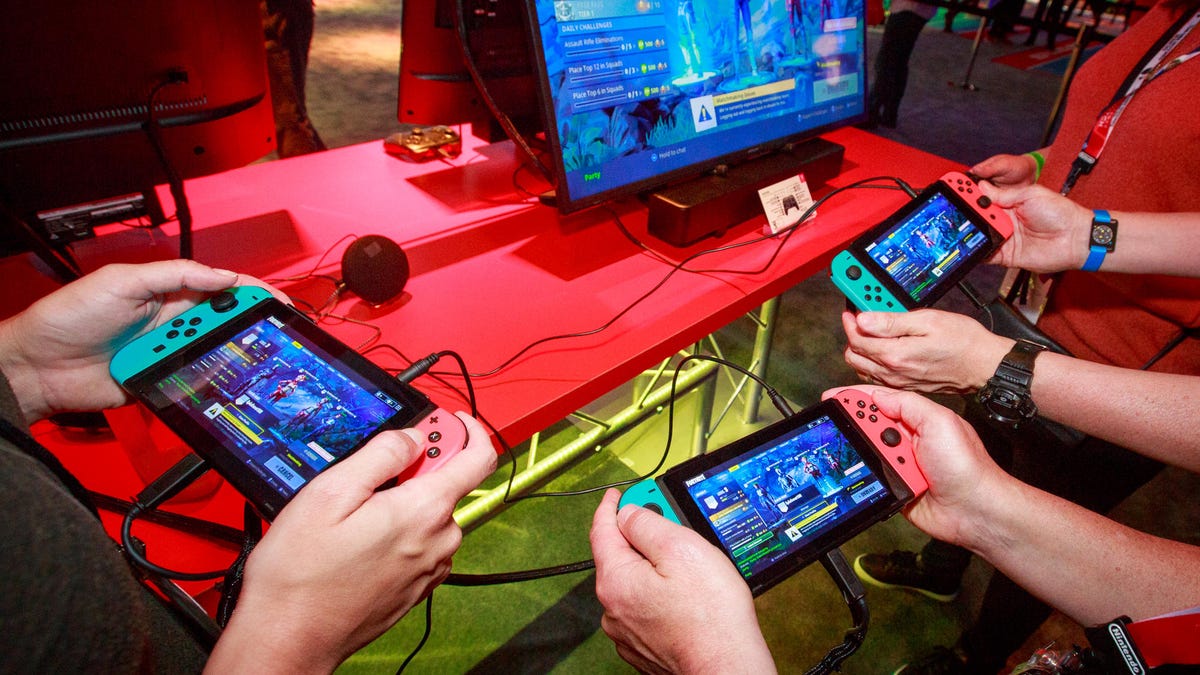Fortnite for Android: Epic tells us why it won't be on Google's Play Store
Epic CEO Tim Sweeney explains to CNET how he's trying to minimize the security risk.

People playing Fortnite on the Nintendo Switch at E3 2018.
Epic Games confirmed on Friday that it plans to bypass Google's Play Store for the eagerly awaited Android launch of Fortnite, its galactically popular online shooter. Instead the developer will point visitors to its site to download and install the game.
Installing an app from anywhere but the official app store is known as sideloading, and requires reducing the security on your phone by opening it up to unknown developers -- until or unless you remember to turn it off.
Why take the security risk? Epic CEO Tim Sweeney told TechCrunch:
On open platforms like PC, Mac and Android, Epic's goal is to bring its games directly to customers. We believe gamers will benefit from competition among software sources on Android. Competition among services gives consumers lots of great choices and enables the best to succeed based on merit.
Fortnite is available in the iOS App Store and iOS is noticeably (and unsurprisingly) absent from the list of open platforms. When queried, Epic told CNET, "If the question is 'Would you have done this on iOS if you could have?' the answer would be 'Yes.'" Consoles that run Fortnite like the PlayStation 4, Xbox One and Nintendo Switch also only allow the game to be installed from their respective digital stores.
We also asked about the security problems with sideloading, which include making sure you download the official app and not a malware-laden clone (though the Play Store isn't immune to them), Sweeney commented to us via email:
Open platforms are an expression of freedom: the freedom of users to install the software they choose, and the freedom of developers to release software as they wish. With that freedom comes responsibility. You should look carefully at the source of software you're installing, and only install software from sources you trust.
Gamers have proven able to adopt safe software practices, and gaming has thrived on the open PC platform through many sources, including Steam, Battle.net, Riot Games, Good Old Games, and EpicGames.com. We're confident Android will be similarly successful.
Most importantly, mobile operating systems increasingly provide robust, permissions-based security, enabling users to choose what each app is allowed to do: save files; access the microphone; access your contacts. In our view, this is the way all computer and smartphone platforms should provide security, rather than entrusting one monopoly app store as the arbiter of what software users are allowed to obtain.
He further clarified in a response to CNET's Sean Hollister on Twitter, saying, "We recognize we're taking on a big responsibility here and take it seriously."
Everyone active in the Android ecosystem, including Google, manufacturers, carriers, and now Epic Games, will need to work together to maximize the security of Android as an open platform. We recognize we're taking on a big responsibility here and take it seriously.
— Tim Sweeney (@TimSweeneyEpic) August 3, 2018
Sweeney says users whose phones are running the latest Android Oreo operating system won't have quite as big a security risk, however:
A "download" button is coming to https://t.co/8upfAAOWZE. On the latest Android Oreo devices, this goes directly to a download link which installs the game following user acceptance of several security prompts - no "unknown sources" involved.
— Tim Sweeney (@TimSweeneyEpic) August 3, 2018
But only 12 percent of Android phones are running that latest version, according to Google's stats -- meaning that Google's ongoing Android fragmentation problem may be partially responsible for the risk to users here.
Google didn't immediately comment.
Of course, it's not a benevolent move on the part of Epic. Like Apple , Google takes a 30 percent cut of all in-app purchases. Those are a big source of revenue for developers, especially for free apps and freely playable games like Fortnite, so there's an incentive for developers who don't need the publicity uplift of being in the store to circumvent it. Sweeney confirmed to Eurogamer that the in-app cut was part of its motivation.
It's a testament to Apple's market power that iOS apps are still wildly attractive to developers -- and contributes to Apple's valuation recently breaking $1 trillion. You can sideload apps on the iPhone , but it's a slightly more involved process.
Originally published 10:15 p.m. PT.
Update, 11:48 p.m. PT: Added tweeted comment.
Update, 1:30 p.m. PT: Added more info from Epic's Tim Sweeney.
Fortnite: Battle Royale tips for gamers just starting out: Learn the essentials before you jump in.



